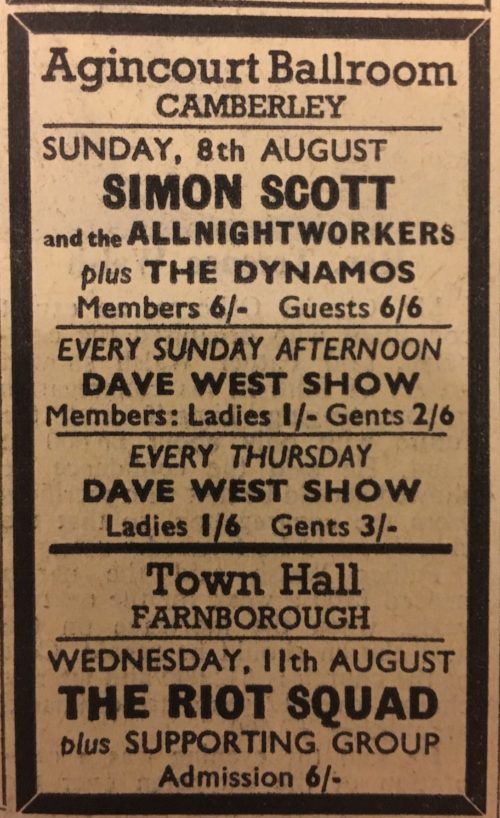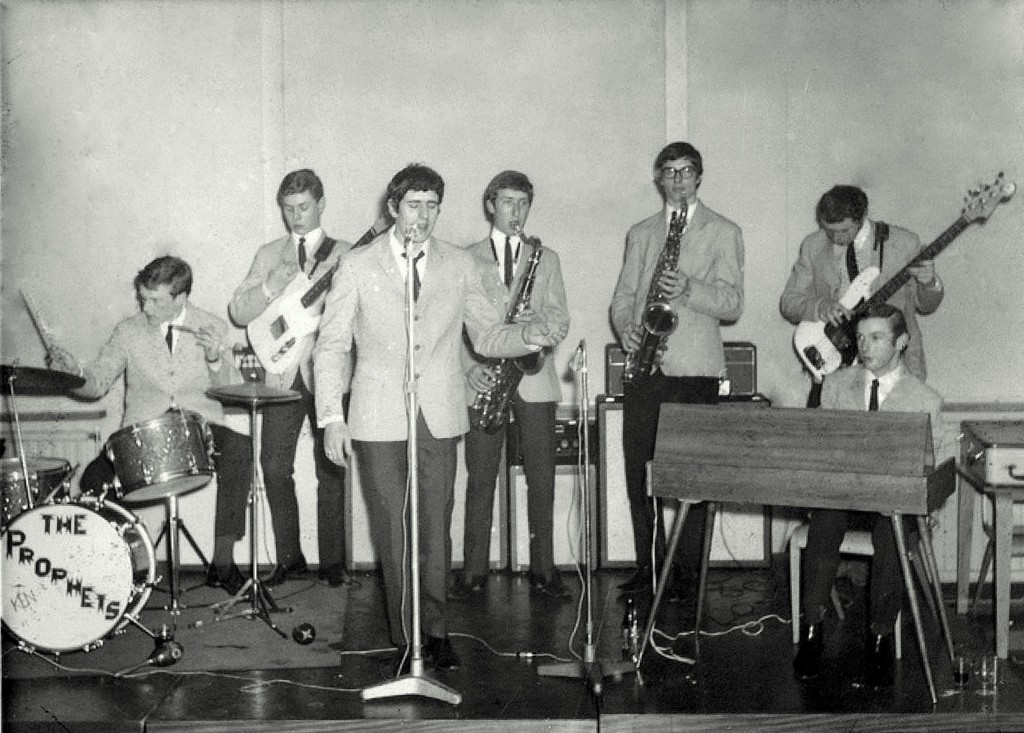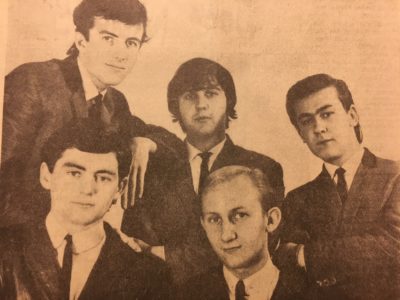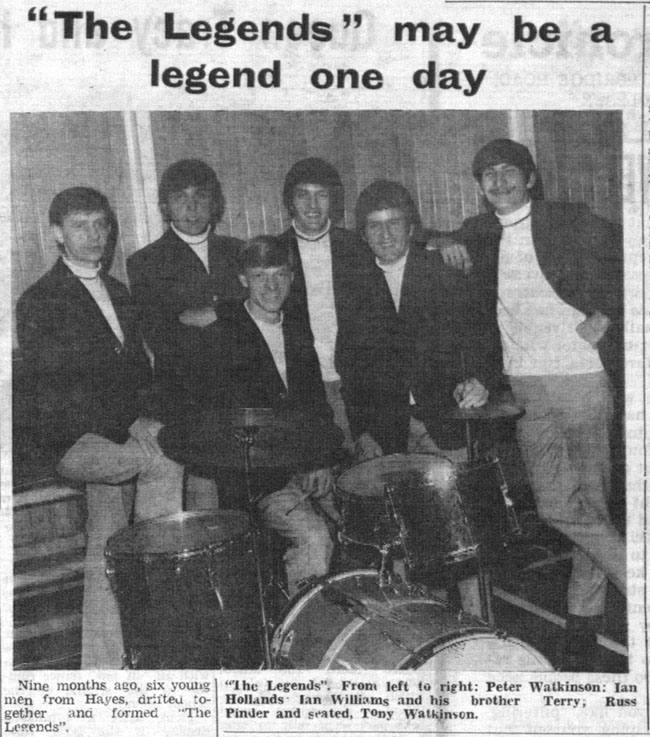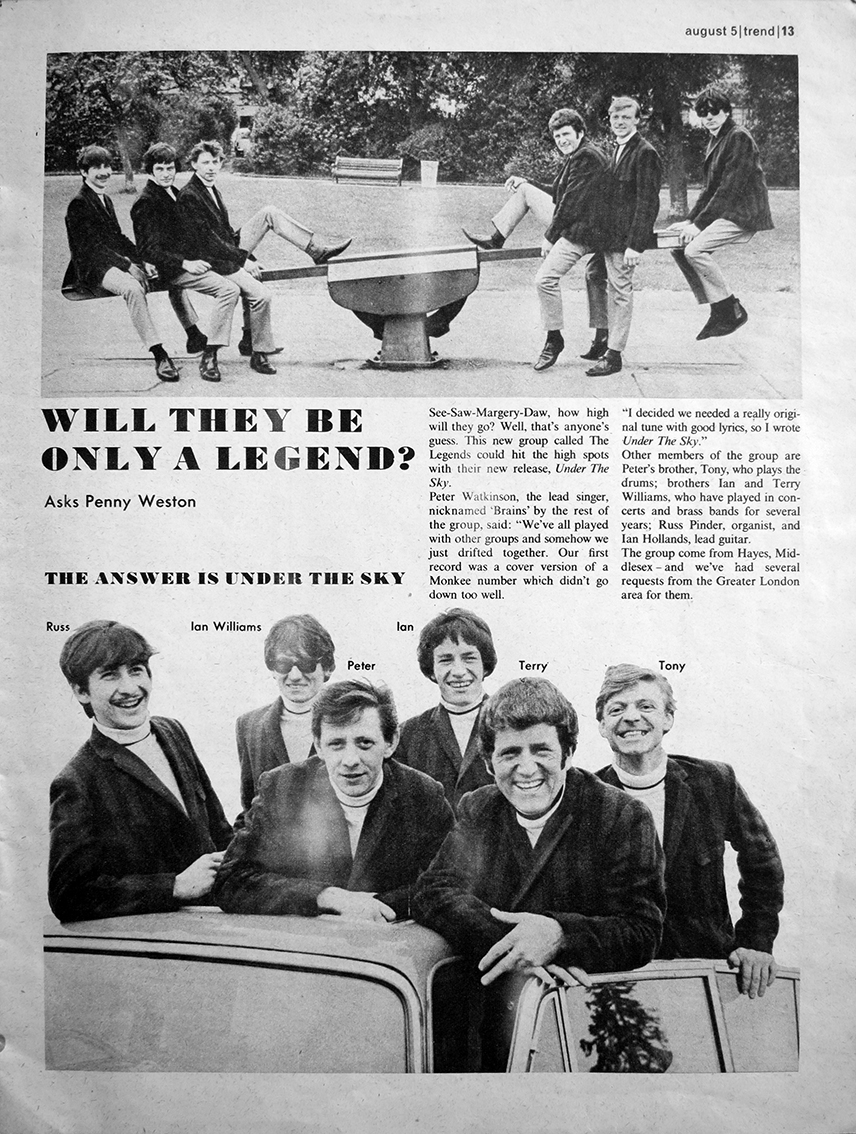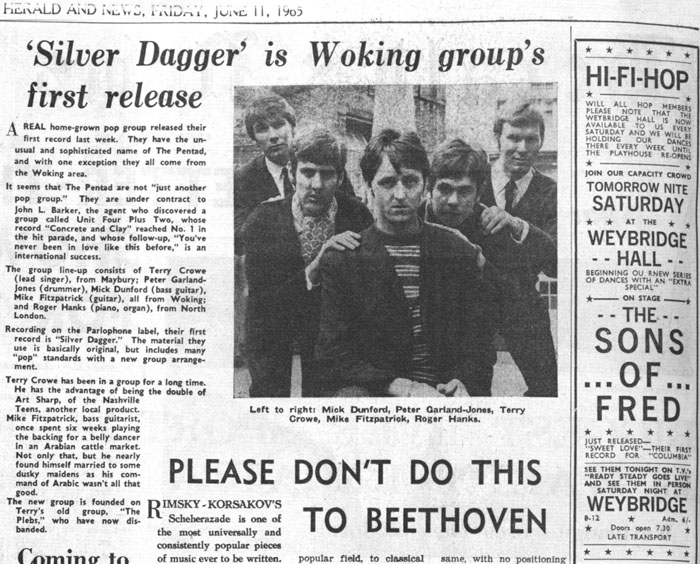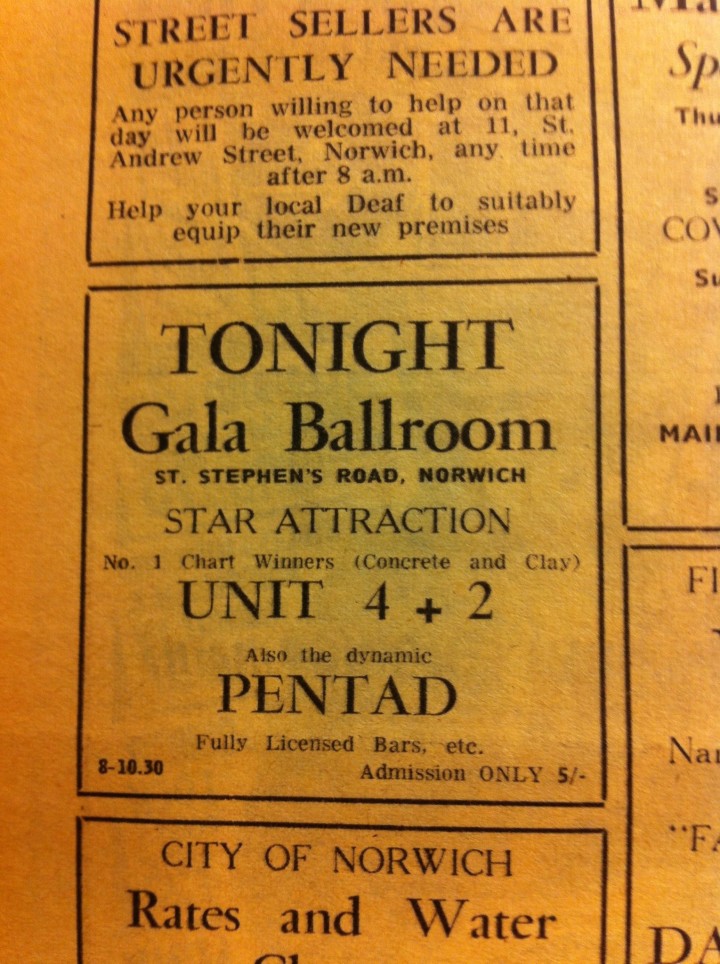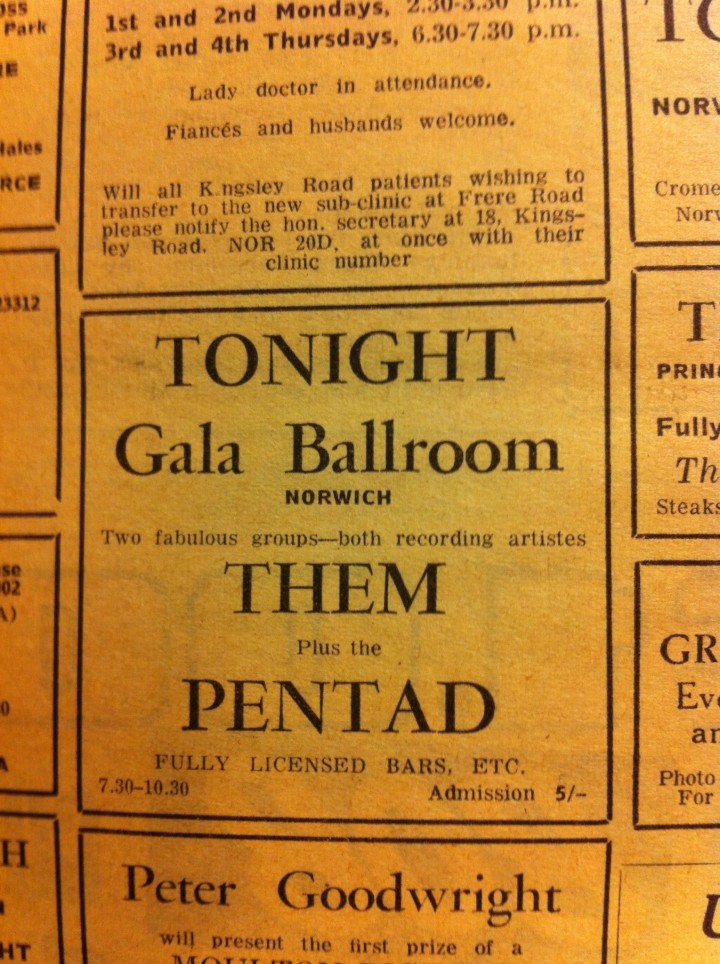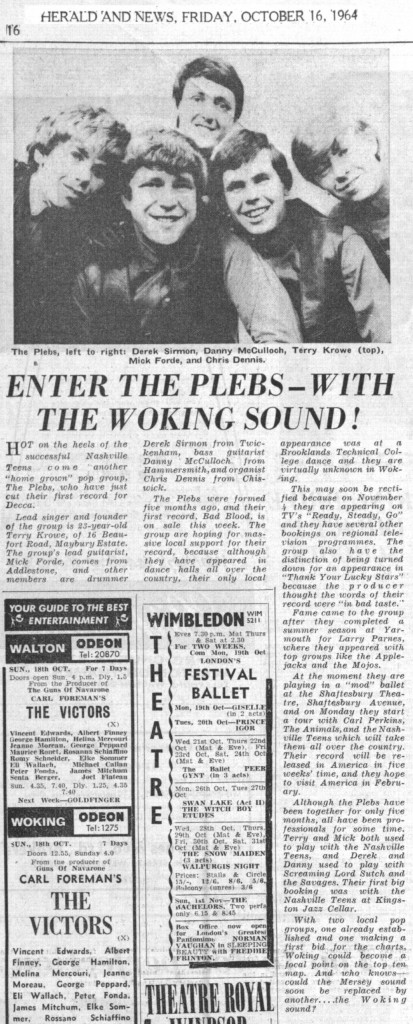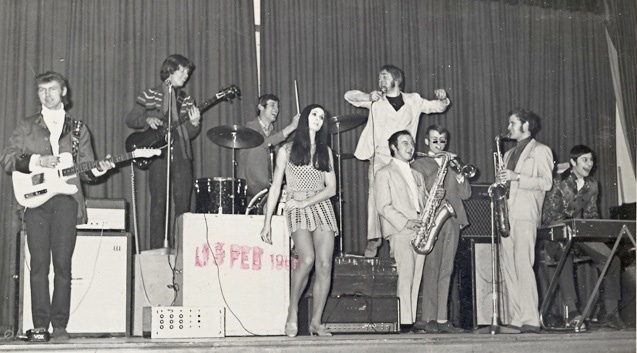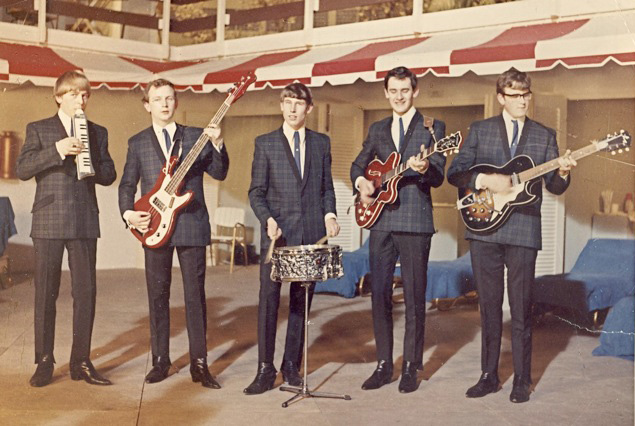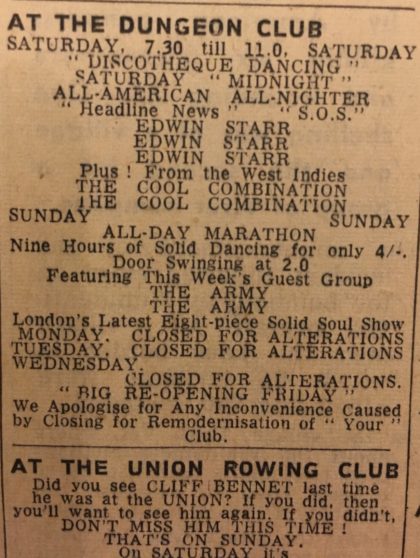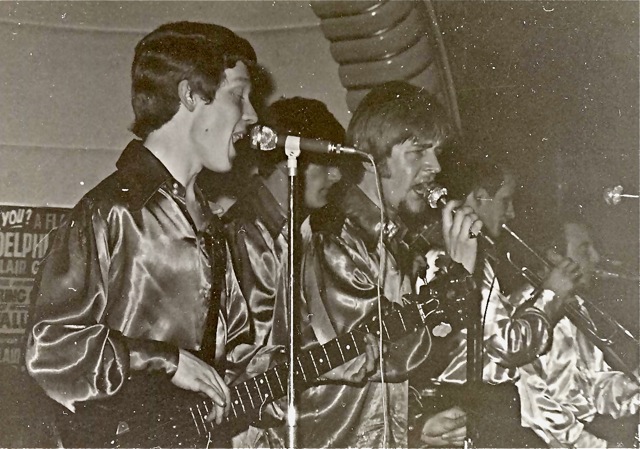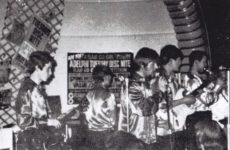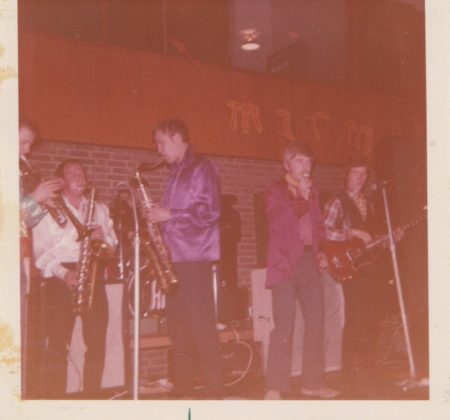The (Jazz) Cellar in Kingston Upon Thames was an important music venue in southwest London from 1962-1966. Many notable local bands played there in their formative years, most notably The Yardbirds and The Nashville Teens. The Animals also played there regularly in the early months of 1964 after moving down to London from the northeast.
I have started to compile a gig list and would welcome any additions/corrections in the comments section. I would also welcome any memories and photos/flyers/posters.
1962
I have only a few entries for 1962 and would welcome any additions
14 July – The Nashville Teens (Surrey Comet)
21 July – The Nashville Teens (Surrey Comet)
28 July – The Nashville Teens (Surrey Comet)
6 September – Mike Berry & The Outlaws (Surrey Comet)
Ritchie Blackmore didn’t join The Outlaws on lead guitar until mid-October 1962
1 November – Screaming Lord Sutch & The Savages (Surrey Comet)
1963
I have only a few entries for 1963 and would welcome any additions
20 February – The Stormsville Shakers (website: http://www.stormsvilleshakers.com/bandhistory.html)

23 February – Dean Lincoln & The Topics (Surrey Comet)
8 March – The Stormsville Shakers (website: http://www.stormsvilleshakers.com/bandhistory.html)
9 March – The Avengers (Surrey Comet)
10 March – Neil Christian (Surrey Comet)

12 March – The Burnettes (Surrey Comet)
14 March – The Barron Knights and The Nashville Teens (Surrey Comet)
21 March – The Stormsville Shakers (website: http://www.stormsvilleshakers.com/bandhistory.html)
12 April – The Stormsville Shakers (website: http://www.stormsvilleshakers.com/bandhistory.html)
2 May – Johnny Kidd & The Pirates (Surrey Comet)
3 May – Neil Landon & The Burnettes (Surrey Comet)
25 May – Paul Danton & The Deputies (Surrey Comet)

26 May – The Laurie Jay Combo and Barry St John (Surrey Comet)
28 May – The Topics (Surrey Comet)
30 May – Sounds Incorporated (Surrey Comet)
20 June – The Solitairs (Surrey Comet)

21 June – The Jet Blacks (Surrey Comet)
2 July – The Stormsville Shakers (website: http://www.stormsvilleshakers.com/bandhistory.html)
17 July – The Roosters (with Eric Clapton) (Surrey Comet)
24 July – The Roosters (with Eric Clapton) (Surrey Comet)
Confusingly, there were two local bands called The Roosters. The first, led by Ben Palmer, included Eric Clapton and future Manfred Mann guitarist Tom McGuiness between January-August 1963.
The second (less celebrated one) featured Pete Jeffries (lead guitar), Del Turner (rhythm guitar), Ron Jefferies (bass) and Jim Strachan (drums). The other gigs below are by this version.
8 August – The Hi-Fi and Tony Kaye (Surrey Comet)
10 August – The Stormsville Shakers (website: http://www.stormsvilleshakers.com/bandhistory.html)
13 August – Colin Shane & The Shannons (Surrey Comet)
29 August – The Stormsville Shakers (website: http://www.stormsvilleshakers.com/bandhistory.html)
7 September – Alex & The Blues Strangers (John Warburg research – see comments section below)
8 September – Screaming Lord Sutch & The Savages (John Warburg research – see comments section below)
12 September – The Rolling Stones (Surrey Comet)
12 October – The Stormville Shakers (website: http://www.stormsvilleshakers.com/bandhistory.html)
21 December – Steve Marriott & The Moonlights (Surrey Comet)
28 December – The Stormsville Shakers (website: http://www.stormsvilleshakers.com/bandhistory.html)
1964
I don’t have a complete listing for 1964 so would welcome any additions

5 January – Screaming Lord Sutch & The Savages (Surrey Comet)
11 January – The Stormsville Shakers (website: http://www.stormsvilleshakers.com/bandhistory.html)
15 January – The Shifters (audition) (John Warburg’s research – see comments section below)
28 January – Neil Landon & The Burnettes (Surrey Comet)
3 February – The Yardbirds (Gus Smith recollections from attending – Monday evening – see comments section below)
5 February – The Animals (first regular Wednesday residency) (Kim Chester research – see comments section below)
7 February – The Druids (Kingston & Malden Borough News)
8 February – The Senators (Kingston & Malden Borough News)
9 February – The Fortunes and The Clifton All Stars (Kingston & Malden Borough News)
10 February – The Yardbirds (Gus Smith recollections from attending)
11 February – The Stormsville Shakers (website: http://www.stormsvilleshakers.com/bandhistory.html)
12 February – The Animals (regular Wednesday residency) (Kim Chester research)
14 February – Im & The Uvvers (Kingston & Malden Borough News)
16 February – Gene Vincent & The Shouts (Surrey Comet)
17 February – The Yardbirds (Gus Smith recollections from attending)
18 February – The Presidents (Kingston & Malden Borough News)
19 February – The Animals (regular Wednesday residency) (Kim Chester research)

21 February – The Mastersounds (Kingston & Malden Borough News)
22 February – The Cracksmen (Kingston & Malden Borough News)
23 February – The Nashville Teens (Kingston & Malden Borough News)
24 February – The Yardbirds (Gus Smith recollections from attending)
25 February – Wayne Gibson & The Dynamic Sounds (Kingston & Malden Borough News)
26 February – The Animals (regular Wednesday residency) (Kim Chester research)
28 February – The Zephyrs and Robb Storme & The Whispers (Kingston & Malden Borough News)
29 February – The Presidents (Kingston & Malden Borough News)

1 March – Grant Tracey & The Sunsets (Kingston & Malden Borough News)
2 March – The Yardbirds (Gus Smith recollections from attending)
3 March – The Stereos (Kingston & Malden Borough News)
4 March – The Animals (regular Wednesday residency) (Kim Chester research)

6 March – The Moquettes (Kingston & Malden Borough News)
7 March – The Pentagons (Kingston & Malden Borough News)
8 March – The Nashville Teens (Kingston & Malden Borough News)
10 March – The Beat Syndicate (Kingston & Malden Borough News)
11 March – The Animals (regular Wednesday residency) (Kim Chester research)

13 March – Steve Marriott & The Wandering Ones (Surrey Comet)
The Kingston & Malden Borough News says that Steve Marriott’s backing band are called The Frantics. The Clapham Advertiser also has this listing, but with Jimmy Powell & The Dimensions in support.
14 March – The Senators (Kingston & Malden Borough News)
15 March – The Gamblers (Kingston & Malden Borough News)
16 March – The Yardbirds (Gus Smith recollections from attending)
17 March – Ronnie Webb & The Phantoms (Kingston & Malden Borough News)
18 March – The Animals (regular Wednesday residency) (Kim Chester research)

20 March – Bridgette Bond (Kingston & Malden Borough News)
21 March – The Cracksmen (Kingston & Malden Borough News)
22 March – Wayne Gibson & The Dynamic Sounds (Kingston & Malden Borough News)
23 March – The Yardbirds (Gus Smith recollections from attending)
25 March – Unit 5 (Teddington, west London band) (Kingston & Malden Borough News) Kim Chester says The Animals played a regular Wednesday residency

26 March – Jerry Lee Lewis (backed by The Nashville Teens) (Norman Sheers’ recollections)

Jerry Leech (see comments section below) confirms that Jerry Lee Lewis played on 26 March

The Kingston & Malden Borough News lists Jerry Lee Lewis for this date with The Nashville Teens and The Original Checkmates


27 March – The Stormsville Shakers with Jerry Lee Lewis (Surrey Comet and website: http://www.stormsvilleshakers.com/bandhistory.html)
28 March – Micky Finn & The Blues Men (Kingston & Malden Borough News)
29 March – The Paramounts (John Warburg’s research – see comments section below)
The Kingston & Malden Borough News lists The Zephyrs for 29 March
30 March – The Yardbirds (Kingston & Malden Borough News)

1 April – The Animals and The Originals (Kingston & Malden Borough News/Harrow Weekly Post)
3 April – The Presidents (Kingston & Malden Borough News)
4 April – The Black Jays (Kingston & Malden Borough News)
5 April – The Druids (Kingston & Malden Borough News)
6 April – The Yardbirds (Kingston & Malden Borough News)

8 April – The Animals (regular Wednesday residency) (Kim Chester research)
10 April – The Cardinals (Kingston & Malden Borough News)
11 April – The Bumblies (Kingston & Malden Borough News) Harrow Weekly Post has Val Foster & The Senators
12 April – Jimmy Stevens & The Exciters (Kingston & Malden Borough News)
13 April – The Yardbirds (Gus Smith recollections from attending)
15 April – The Animals (Kingston & Malden Borough News)
16 April – Tommy Quickly & The Remo Four (Record Mirror)
17 April – The Stormsville Shakers (website: http://www.stormsvilleshakers.com/bandhistory.html)
18 April – Kal Foster & The Senators (Kingston & Malden Borough News)
19 April – The Nashville Teens (Kingston & Malden Borough News)
20 April – The Yardbirds (Surrey Comet)
Record Mirror confirms that The Yardbirds play every Monday
22 April – The Tridents (Surrey Comet and John and Paul Lucas’ diaries)
The Kingston & Malden Borough News lists The Animals for 22 April
27 April – The Yardbirds (Record Mirror)
30 April – The Animals (regular Wednesday residency) (Kim Chester research)

2 May – The Plebs and The Original Topics (Surrey Comet)
3 May – Micky Finn & The Bluesmen (Surrey Comet)
4 May – The Yardbirds (Gus Smith recollections from attending)

6 May – The Nashville Teens (Surrey Comet)
8 May – Steve Marriott & The Frantic Ones (Surrey Comet)

9 May – Micky Finn with The Black Jays (Surrey Comet)
10 May – Micky Finn & The Bluemen (Surrey Comet)
11 May – The Yardbirds (confirmed by Gus Smith who attended)
13 May – Tony Colton & The Crawdaddies (Surrey Comet)
15 May – The Moquettes (Surrey Comet)
16 May – The Stormsville Shakers (website: http://www.stormsvilleshakers.com/bandhistory.html)
18 May – The Plebs (Surrey Comet)
20 May – The Pretty Things (Record Mirror)

23 May – The Micky Finn (Surrey Comet)
24 May – The Plebs (Surrey Comet)
25 May – The Yardbirds and The Grebbels (Surrey Comet)
27 May – The Tridents with The Plebs (Surrey Comet and John and Paul Lucas’ diaries)

29 May – Phil & The Stormsville Shakers (Surrey Comet)
30 May – The Karnells (Surrey Comet)
31 May – The Micky Finn (Surrey Comet)
1 June – The Yarbirds (Surrey Comet)
3 June – The Animals (regular Wednesday residency) (Kim Chester research)

Record Mirror says that John Lee Hooker played on 3 June supported by John Mayall’s Bluesbreakers and with The Plebs opening. Surrey Comet confirms
5 June – The Pitmen (Surrey Comet)
6 June – The Road Runners (Surrey Comet)
7 June – The Satins (Record Mirror)
8 June – The Yardbirds (Surrey Comet)

10 June – Group Four + One (Surrey Comet)
12 June – The Plebs (Surrey Comet)
13 June – Group Four + One (Surrey Comet)
14 June – Tony Holland & The Packabeats (Surrey Comet)
15 June – The Plebs (Surrey Comet)
17 June – Group Four + One (Record Mirror)
19 June – The Henchmen (Record Mirror)

20 June – The Plebs (Surrey Comet)
21 June – The Tridents (Record Mirror) replaced by The Vincents (Surrey Comet)
Lindsay Bex, who played drums with the band at the time, notes in his diary the following “Off – A O’Donnel”, which suggests that the gig was cancelled. Surrey Comet confirms as they have The Vincents.
22 June – The Yardbirds (Surrey Comet)
24 June – The Smokey Beats (Record Mirror)
26 June – The Countdowns (Record Mirror)
Surrey Comet has The Plebs instead of The Countdowns
27 June – The Stormsville Shakers (website: http://www.stormsvilleshakers.com/bandhistory.html)
28 June – The Playboys (Record Mirror)
29 June – The Yardbirds and The Grebbels (Surrey Comet)

1 July – Five’s Company (Surrey Comet)
3 July – Group Four + One (Surrey Comet)

4 July – Five’s Company (Surrey Comet)
5 July – Cops & Robbers (Surrey Comet)
8 July – Johnny & The Spirits (Surrey Comet)
10 July – The Echoletts (Surrey Comet)
11 July – The Laurie Jay Combo (Surrey Comet)
12 July – The Stereos (Surrey Comet)
13 July – Group Four + One (Surrey Comet)
17 July – The Plebs (Surrey Comet)
18 July – Earl Sheridan & The Houseshakers (Surrey Comet)
19 July – Guest group (Surrey Comet)
20 July – The Yardbirds (Surrey Comet)
22 July – Group Four + One (Surrey Comet)
24 July – The Presidents (Record Mirror)
25 July – Mickie Finn & The Blue Men (Record Mirror)
26 July – Guest group (Surrey Comet)
27 July – Group Four + One (Record Mirror)

29 July – The Impacts (Surrey Comet)
31 July – The Original Topics (Surrey Comet)
1 August – The Web (Surrey Comet)
2 August – Guest group (Surrey Comet)
3 August – The Yardbirds (Surrey Comet)

5 August – The Animals and The Plebs (club flyer)
7 August – The Plebs and The Denims (club flyer)
Surrey Comet has Screaming Lord Sutch & The Savages on 7 August
8 August – Group Four + One (club flyer)
9 August – The Nite Shift (club flyer)
Jeff Beck was the band’s lead guitarist but would join The Tridents in early September.
10 August – The Mike Cotton Sound (club flyer)

12 August – The Nashville Teens and The Beat Syndicate (club flyer/Surrey Comet)
14 August – The Jet Set (Surrey Comet)
15 August – The Playboys (Surrey Comet)
16 August – Guest group (Surrey Comet)
17 August – The Mojos (Kingston & Malden Borough News)
19 August – Guest group (Surrey Comet)
21 August – Wayne Gibson & The Dynamic Sounds (Surrey Comet)

22 August – The Bumblies (Surrey Comet)
23 August – The Cheaters (Surrey Comet)
24 August – Group Four + One (Surrey Comet)

26 August – The Moonrakers (Surrey Comet)
28 August – The Plebs (Surrey Comet)
29 August – The Presidents (Surrey Comet)
30 August – Guest group (Surrey Comet)
31 August – The Mike Cotton Sound (Surrey Comet)
5 September – The Plebs (Surrey Comet)
7 September – The Mojos (Surrey Comet)
9 September – Guest group (Surrey Comet)
11 September – The Druids (Surrey Comet)
12 September – The Bumblies (Surrey Comet)
13 September – Guest group (Surrey Comet)
14 September – The Roosters (Surrey Comet)
This gig (and the remaining ones below) were performed by the second version of The Roosters and not the one that featured Eric Clapton and Tom McGuiness between January-August 1963 (see entries above from July 1963).
16 September – Guest group (Surrey Comet)
18 September – Linda Crane & The Cosmic Sounds (Surrey Comet)
19 September – The Profits (Surrey Comet)
20 September – Guest groups (Surrey Comet)
21 September – Group Four + One (Surrey Comet)
23 September – Two groups (Record Mirror) Surrey Comet has The Cheaters
25 September – The Cosmic Sounds with Linda Crain (aka Crane) (Record Mirror) Surrey Comet has The Wranglers

26 September – The Roosters (Surrey Comet)
27 September – Two groups (Record Mirror)
28 September – Group Four + One (Record Mirror)
30 September – Guest group (Surrey Comet)
2 October – The College Boys (Surrey Comet)

3 October – Little Richard & The Objects (Surrey Comet)
4 October – Guest group (Surrey Comet)
5 October – The Mike Cotton Sound (Surrey Comet)
7 October – Rock ‘n’ Roll competition (Record Mirror/Surrey Comet)
9 October – The Roosters (Record Mirror)
10 October – Im an The Uvvers (Record Mirror)
11 October – The Jaguars (Surrey Comet)

12 October – The Mojos and The Orbits (Record Mirror)
14 October – Guest group (Surrey Comet)
16 October – The Roosters (Surrey Comet)
17 October – Earl Sheridan & The Houseshakers (Record Mirror)
18 October – Guest group (Surrey Comet)
19 October – The Mike Cotton Sound (Record Mirror)
21 October – Guest group (Surrey Comet)
23 October – Neil Christian & The Crusaders (Surrey Comet)
24 October – The Challengers (Surrey Comet)
25 October – Guest group (Surrey Comet)

26 October – Little Eva, The Stereos, The College Boy, The Rockin’ Welsh Boys and Danny Storm & The Strollers (Surrey Comet)
28 October – Unit 5 (Teddington, west London band) (Surrey Comet)
30 October – The Exciting Stereos (Record Mirror)
31 October – The Roosters (Surrey Comet)
1 November – The Group Survival (Record Mirror)
2 November – Themselves (Record Mirror)
4 November – The Roosters and XL5 (Surrey Comet)
7 November – Cosmic Sounds (Surrey Comet)
13 November – The Impacts (Surrey Comet)
16 November – Jimmy Reed, The Plebs and John Lee Groundhogs (Surrey Comet)
18 November – Carl Perkins and The Cosmic Sounds (Surrey Comet)
21 November – Themselves (Surrey Comet and Gus Smith recollections from attending)
24 November – The Yardbirds (Gus Smith recollections from attending)
27 November – Unit 5 (Teddington, west London band) (Surrey Comet)
28 November – The Jaguars (Gus Smith recollections from attending)
4 December – The Bo-Sneakers (Gus Smith recollections from attending)
12 December – The Roosters (Gus Smith recollections from attending)
18 December – The Roosters (Surrey Comet)
26 December – The Roosters (Surrey Comet)
1965
I don’t have a complete entry for 1965 and would welcome any additions

2 January – The GTs (Gus Smith recollections from attending)
4 January – Alex Harvey & His Soul Band (Melody Maker)
9 January – The John Smith Group (Gus Smith recollections from attending)
15 February – Screamin’ Jay Hawkins (Melody Maker)
20 February – John Brown’s Bodies (Gus Smith recollections from attending)
5 March – Alex Harvey & His Soul Band (Melody Maker)
6 March – The Rising Suns (all-nighter session) (Gus Smith recollections from attending)
1 May – The Shondells (Surrey Comet)
8 May – Teddy & The Dymes (Surrey Comet)

15 May – The Shondells (Surrey Comet)

22 May – Davey Sands & The Essex (Surrey Comet)

29 May – The Tribe (Surrey Comet)
3 June – John Mayall’s Bluesbreakers (Surrey Comet) This may have been 2 June
5 June – The Shondells (Surrey Comet)
12 June – Ancient Britons and Twinkle (Surrey Comet)
19 June – The Just Five and The Exciting Rippers (Surrey Comet)
26 June – The RBQ (Surrey Comet)
3 July – The Stormsville Shakers (website: http://www.stormsvilleshakers.com/bandhistory.html)
10 July – Davey Sands & The Essex (Surrey Comet)
17 July – The Shanes (Surrey Comet)
24 July – The Dagoes (Surrey Comet)
31 July – The Lonely Ones (Surrey Comet)
4 August – Sugar Pie Desanto, The Shevelles and The Backbeats (Surrey Comet)
7 August – The Small Faces (Surrey Comet)
15 August – John Mayall’s Bluesbreakers (Surrey Comet) This might be 14 August

20 August – Unit 4 Plus 2 (Surrey Comet)
21 August – Davey Sands & The Essex (Surrey Comet)

25 August – Zoot Money’s Big Roll Band (Surrey Comet)
28 August – The Shondells (Surrey Comet)
3 September – The Small Faces (Surrey Comet)
10 September – The Moody Blues (Surrey Comet)

11 September – Heart and Souls, The Valkeries and The Right Track (Surrey Comet)
15 September – Lou Johnson (Surrey Comet)

24 September – The In Crowd (Surrey Comet)

1 October – The Artwoods (Surrey Comet)

2 October – The Valkeries and The Geordies (Surrey Comet)

9 October – The Lonely Ones, The Shakedowns, The Flashbakks and Kiko 6 (Surrey Comet)

15 October – Steampacket with Long John Baldry, The Brian Auger Trinity, Rod Stewart, Julie Driscoll and Next of Kin (Surrey Comet)
23 October – The Lonely Ones (Surrey Comet)

30 October – The Fetish Crowd (Surrey Comet)
3 November – Hedgehoppers Anonymous and Randy’s Incaras (Surrey Comet)
5 November – The Lonely Ones (Surrey Comet)

19 November – The Phil Wainman Sound (Surrey Comet)

20 November – The Lonely Ones and Junior Ervin and The Midnite Hours (Surrey Comet)
24 November – The Small Faces (Surrey Comet)

26 November – The Clayton Squares (Surrey Comet)

3 December – The Burnettes (Surrey Comet)

10 December – The Clayton Squares (Surrey Comet)
11 December – The New Breed (Surrey Comet)

17 December – Sons of Fred (Surrey Comet)
23 December – The New Jump Band (Bob Hodges’ diary)
1966
This is an incomplete list and I would welcome any additions
7 January – The Lonely Ones (New Musical Express)
8 January – The Anteeks (New Musical Express)
14 January – The Anzacs (New Musical Express)
15 January – Next of Kin (New Musical Express)
22 January – The Flashbacks (New Musical Express)
28 January – Big Jump Band (aka New Jump Band) (Bob Hodges’ diary)
29 January – The Anzacs (New Musical Express)
4 February – The Big Sound (New Musical Express)
5 February – Group Survival (New Musical Express)
11 February – Jimmy Winston & The Rebels (New Musical Express)
12 February – The Lonely Ones (New Musical Express)
16 February – The Small Faces (New Musical Express)
18 February – The Lovin Kind (New Musical Express)
19 February – Rey Anton & The Peppermint Men (New Musical Express)
25 February – Jimmy Winston’s Reflections (New Musical Express)

26 February – The Marvels (New Musical Express) Colin Stoddart says his band The Candles also played on this date
4 March – Pinkerton’s Assorted Colours (New Musical Express)
5 March – The Night Society (New Musical Express)
12 March – The New Jump Band (New Musical Express)
18 March – Jimmy Winston’s Reflections (New Musical Express)
19 March – The John Warner Sound (New Musical Express)
23 March – The Nashville Teens (New Musical Express)
25 March – Jo Jo Gunne (New Musical Express)
26 March – The New Jump Band (New Musical Express)
30 March – The John Warner Sound (New Musical Express)
1 April – The Lonely Ones (New Musical Express)
2 April – Jo Jo Gunne (New Musical Express)
8 April – The Lonely Ones (New Musical Express)
9 April – The Beat Syndicate (New Musical Express)
10 April – The Silence (New Musical Express)
15 April – The Sons of Fred (New Musical Express)
16 April – The Night Society (New Musical Express)
17 April – Screaming Lord Sutch & The Savages (New Musical Express)
22 April – The Silence (New Musical Express)
23 April – The New Jump Band (New Musical Express)
29 April – The Protest (New Musical Express)
30 April – The Silence (the group changed name to John’s Children) (New Musical Express)
5 May – The Pages Five (New Musical Express)
6 May – The Troggs (New Musical Express)
8 May – The Jaguars (New Musical Express)
13 May – Jimmy Winston & The Reflections (New Musical Express)
13 May – Jo Jo Gunne (New Musical Express)
20 May – The Voyd (New Musical Express)
21 May – Time-Flys (New Musical Express)
27 May – The Legend (New Musical Express)
28 May – The Void (New Musical Express)
3 June – The Daisys (New Musical Express)
4 June – John Brown’s Bodies and Jesse Hector (New Musical Express)
10 June – John Hilton Starr & The Savages (New Musical Express)
11 June – Jo Jo Gunne (New Musical Express)
12 June – Froy Talbert (New Musical Express)
13 June – The Small Faces (New Musical Express)
17 June – The Voyd (New Musical Express)
18 June – The Anzacs (New Musical Express)
24 June – John Hilton Starr & The Savages (New Musical Express)
25 June – The Rick ‘N’ Beckers (New Musical Express)
1 July – The Lonely Ones (New Musical Express)
2 July – The Anzacs (New Musical Express)
8 July – The Troggs and The Wild Uncertainty (their debut) (New Musical Express)
16 July – The Wild Uncertainty (New Musical Express)
22 July – The Wild Uncertainty (New Musical Express)
23 July – The Flashbacks (New Musical Express)
29 July – The Night Society (New Musical Express)
30 July – The Subjects (New Musical Express)
6 August – Jo Jo Gunne (took part in London Palladium competition around now)
12 August – Jo Jo Gunne (New Musical Express)
13 August – The Missing Links (New Musical Express)
19 August – Cream (New Musical Express)
20 August – The Night Society (New Musical Express)
26 August – The Graham Bond Organisation (New Musical Express)
27 August – Four Plus a Bit (New Musical Express)
The Kingston & Malden Borough News ran an article on the club’s closure which was published in its 9 December 1966 issue on page 4 with the headline: “Cellar club ‘killed by drugs’ is sold to bingo syndicate”.
Copyright © Nick Warburton. All Rights Reserved. No part of this article may be reproduced or transmitted in any from or by any means, without prior permission from the author.

